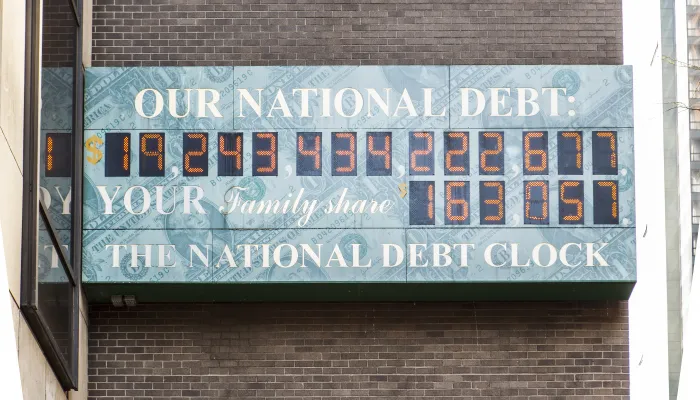Judd Gregg: Lessons from a coming recession
Judd Gregg, a former Republican senator from New Hampshire, served as chairman of the Senate Budget Committee from 2005 to 2007 and ranking member from 2007 to 2011. He recently wrote an op-ed featured in The Hill. It is reposted here.
In recent weeks, wild fluctuations in the stock market together with the pessimistic views of economic and financial pundits, have been suggesting that we may be on the precipice of a recession.
Europe definitely seems to be slipping into some form of economic contraction. China has slowed significantly. Japan has come to a dead stop, requiring the formal institution of negative interest rates by its central bank.
These concerns have been exacerbated in the U.S. by the constant pounding of Wall Street as the source of all that is wrong.
It is difficult to be a banker in America today. Their status on the pecking order of who is to blame for the nation’s troubles has fallen below the level of even the Congress, some of whose members are ironically the bankers’ most vociferous accusers.
It is important to get beyond the outrage and actually figure out what is slowing our economic growth, thus creating such angst on the Main Streets of America.
There is no question but that the financial crisis and ensuing recession of 2008 has inflicted deep scars on our psyche.
People of ordinary means lost a great deal of their wealth as pension funds, 401ks and IRAs wilted, decimating savings.
The pain was especially acute for the retired or the near-retired. These folks, part of the baby boomer generation, are a huge demographic segment of our society.
They were uniquely and badly positioned for the recession. They had no more runway in terms of earning capacity and found themselves financially floundering. It was bad for many, and it still is.
Even though the stock market recovered in the following years, the Federal Reserve has punished this group disproportionately with its regime of historically low interest rates.
It could be argued that to the extent the recovery has occurred, it has been accomplished by transferring massive amounts of wealth from the retired and near-retired to the younger, working generations.
Mark one up for why this recovery is so anemic.
We all know that most jobs are created by entrepreneurs. They start small businesses that grow into larger businesses.
The lifeblood of this growth, beyond the good ideas and hard work that get things off the ground, is the availability of money. Almost every expanding business outstrips its available startup capital and needs outside resources to grow.
This liquidity usually comes in the form of loans. But under the new regime where bankers are viewed as the enemy of the people and where they are burdened with massive regulations that discourage loans, obtaining funds is extremely difficult.
As a result of the Dodd-Frank reforms specifically, and the dialogue of the political marketplace in general, there is a dramatic chilling of the ability to get funds for growing businesses. Dodd-Frank and its supporters have turned this vital faucet down to a dribble.
Of course the left, including Hillary Clinton and Bernie Sanders, denies this. But people like Clinton and Sanders have never stepped beyond the boundary of their government experience and arrogance to actually try to grow a business.
Instead of solving the problem of “too big to fail,” we now have a problem of banks that are "too regulated to lend." It is a typical response by the government to a problem — one in which the unintended consequences of the response reverberate negatively through the system.
Next, there is the issue of tax policy. It is obvious that our tax policy is upside down. We give deductions to the inefficient but well-connected, while penalizing the growth engines.
With total tax rates at or over fifty percent in most states, it is difficult to get productivity up. What is the point, if half of what one earns goes to governments whose stewardship of those funds is questionable at best? Tax policy is truly a wet blanket that has been thrown over the economy.
Most importantly, there is something called confidence. It could also for many be called The Dream.
It is the belief that the nation is on the right track. It is a faith that if you work hard, do the right thing such as pursuing your education, and play by the rules, then you and your family will reap commensurate economic rewards.
We are losing this confidence. The rise of populism, facilitated in part by the parallel rise of social media, reflects this concern.
This optimism in the nation’s future — and in the future of its individual citizens — is at the heart of the American spirit and culture. But it is now on a downward spiral.
Leadership that captures our special values and strengths is needed. Of course, this must be coupled with action.
We could definitely use a national dialogue that calls upon our better purposes and praises our historic and still vibrant model of individual initiative as the engine of economic growth.
Sadly we are not getting such leadership. President Obama has disappeared into a cloud of global warming, our presidential candidates debate each other’s personal failures and our Congress is in permanent hold mode.
There are numerous actions — not overly difficult or even controversial — that could reverse our slide toward a national economy that is too anemic to give lift to people’s dreams. But they are not being pursued.
If a recession is indeed coming, it is largely a consequence of unnecessary and avoidable public polices.
"My Views" are works published by members of the Committee for a Responsible Federal Budget, but they do not necessarily reflect the opinions of all members of the committee.


